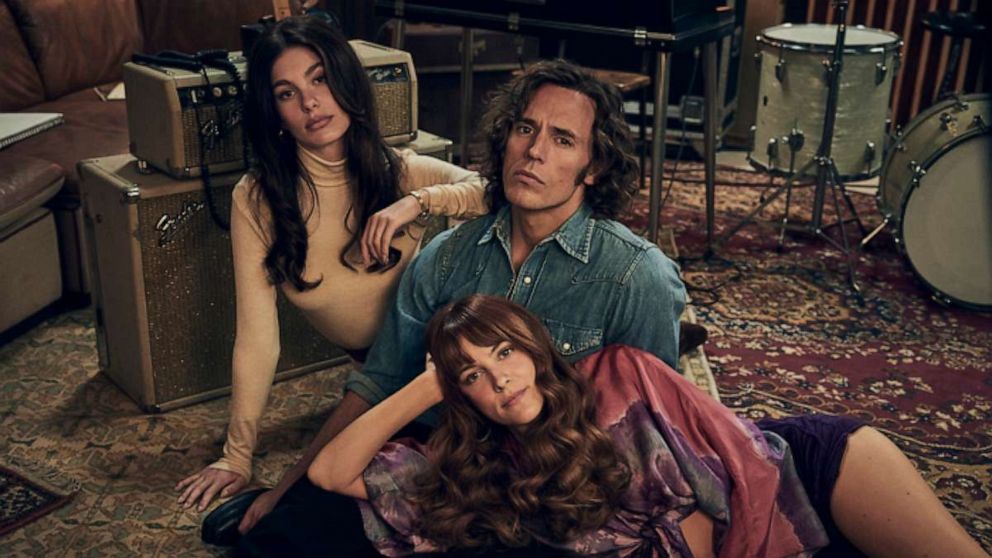
You can't wish the 1970s Los Angeles music scene back to life. But "Daisy Jones & The Six," the 10-part limited series that starts streaming March 3 on Amazon Prime Video (the first three episodes are available to binge immediately) spares no expense to make you think you can.
The behind-the-music drama of Fleetwood Mac, a real band that immediately evokes the '70s, becomes the template for the fictional "Daisy Jones & The Six," which sure has its moments over 10 hours but remains frustratingly hit or miss.
Based on the bestseller by Taylor Jenkins Reid, the docudrama, starring Riley Keough -- the grandchild of Elvis Presley -- as Daisy Jones, mirrors the musical and sexual tensions among band members that fired up Fleetwood Mac's multi-platinum 1977 album "Rumours."
Having started as a U.K. act with drummer Mick Fleetwood and guitarist John McVie and his vocalist wife Christine McVie, Fleetwood Mac later kicked off tumultuous changes by adding guitarist Lindsey Buckingham and his girlfriend, singer-songwriter-tambourine goddess Stevie Nicks, who sent the band soaring on the charts, sparking dish about her affair with the married Fleetwood.
"Daisy Jones & The Six" mixes things up just enough to avoid charges of exploitation, but there's no skimping on sex, drugs and rock 'n' roll. Like Nicks, Keough's Daisy Jones comes late to the band. A child of wealth and parental neglect, the rebellious, pill-popping, coke-snorting Daisy waits tables while struggling to make it on her own terms.
MORE: Oscar nominations 2023: Peter Travers on the snubs and surprisesIt's music producer Teddy Price (a terrific Tom Wright) who offers to shape her talent. "I don't need shaping," snaps Daisy with the fire we expect from Keough, whose performances in "It Comes at Night," "American Honey" and "Zola" are filled with the ferocity and feeling that mark a talent to watch. She's mesmerizing at showing the sad eyes that negate Daisy's radiant smile.
At first Daisy resists Teddy's efforts to connect her with The Six, a Pittsburgh band fronted by Billy Dunne, played with brooding rock star charisma by Brit actor Sam Claflin ("The Hunger Games," "Enola Holmes"). Like Keough, Claflin had no experience singing on screen. And it shows, though their acting is strong enough to blow past that obstacle.
Billy sees no need for Daisy. He's thinks he's doing just fine in LA with his brother Graham (Will Harrison) and their bandmates, Eddie Roundtree (Josh Whitehouse), Warren Rhodes (Sebastian Chacon) and newbie keyboardist Karen Sirko, well played by London model Suki Waterhouse.
Though they are only five members, the band calls itself The Six because "5" is already taken and "six" sounds like "sex," of which there is plenty. Graham yearns for Karen who's attracted to heartthrob Billy who feels more for Daisy than his wife Camila (Argentine model Camila Morrone is quietly devastating), the mother of his child and the band's unofficial photographer and publicist.
Even Fleetwood Mac never had sexual tensions this complicated, which is the point, I guess. For added impact, James Ponsoldt ("The Spectacular Now"), who directs the first five episodes, keeps flashing ahead 20 years as the band members discuss for the first time why they broke up after their great success with "Aurora," their own album version of "Rumours."
MORE: Review: 'M3gan' is a miracle of modern horror cinema that leaves you reelingThere's no avoiding the slide into soft-rock cliches as the movie follows the pattern of rags-to-riches to druggy self-destruction that marks rock biopics from "Bohemian Rhapsody" to "Elvis."
Luckily, Keough and Claflin give their all to the love-hate dynamic between Daisy and Billy as each fights for band dominance. Unluckily, even the better earworms -- contributed by the gifted likes of Phoebe Bridgers, Marcus Mumford, Jackson Browne and Grammy winner Blake Mills -- can't match the vibrant "Go Your Own Way" pow of Fleetwood Mac.
"Daisy Jones & The Six" wins points as a nostalgia trip from dingy clubs to the roar of stadium crowds, from bedrooms to personal battlefields. But you'll feel more deeply hearing Stevie Nicks sing one lyric from "Landslide" then 10 hours of watching what should have been a bruising rock opera descend into a emo-ballad.